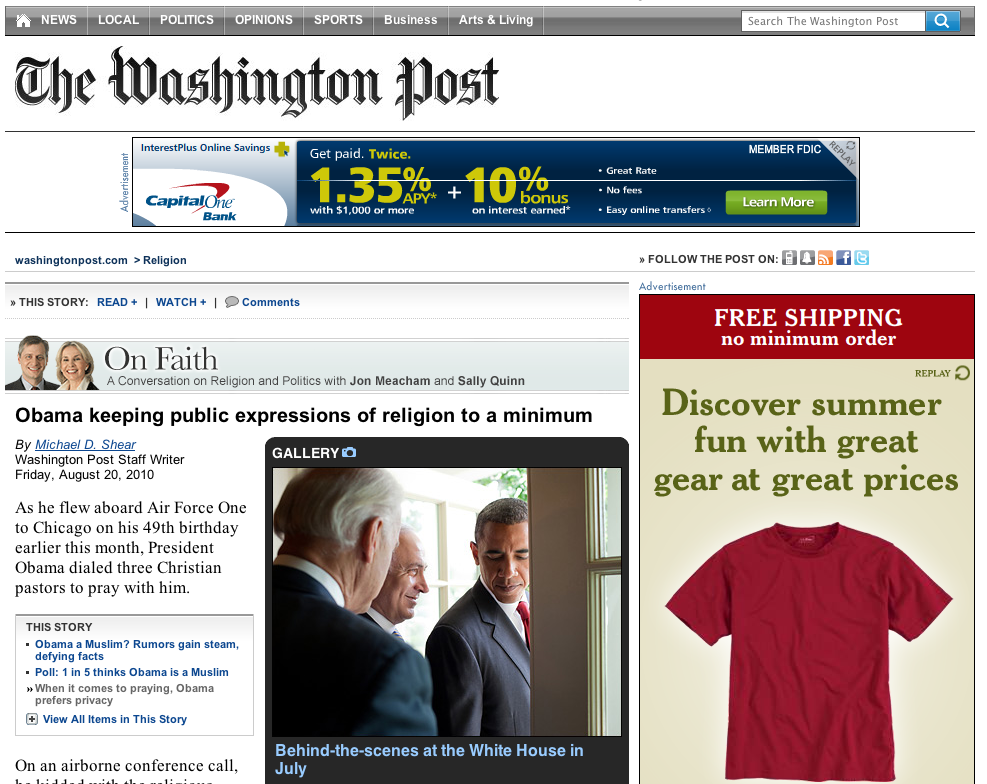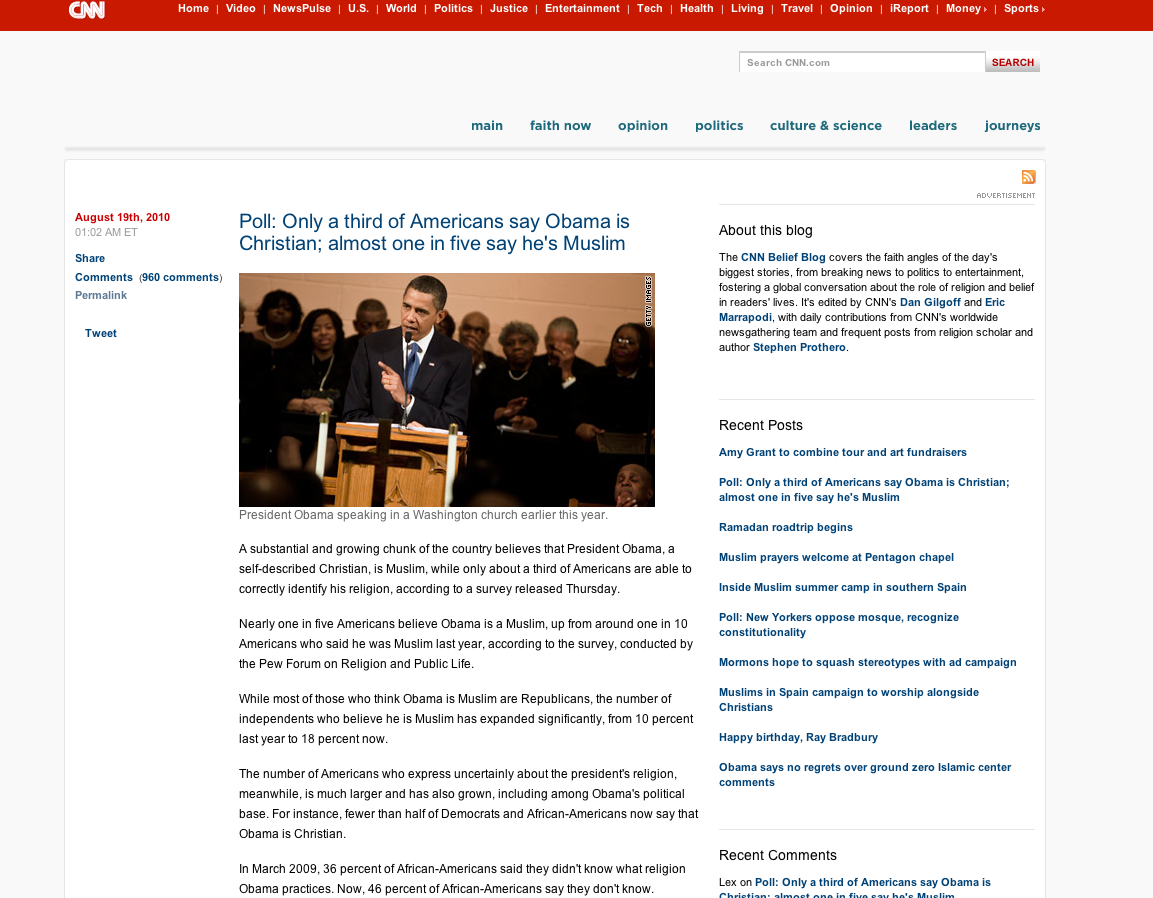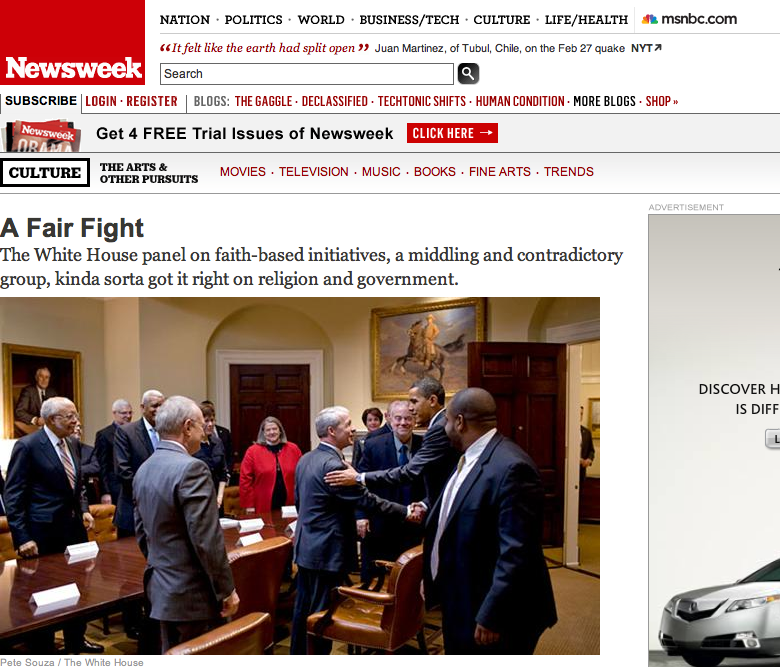 By Daniel Burke | Religion News Service
By Daniel Burke | Religion News Service
Near the end of a bumpy first year in office, President Obama readied for a Christmas vacation in Hawaii, but before he left, he called on a group of five ministers for a spiritual recharge.
Like previous prayer calls, this one was more personal than political.
"He certainly does not ask us how we would run the country and what issue to pursue or not pursue," said Bishop Charles Blake of the Los Angeles-based Church of God in Christ, who was on the call.
For 10 minutes, the president and the pastors prayed for peace, an economic recovery, protection for U.S. soldiers, and for Obama to be guided by a wisdom and power beyond himself.
Glimpses into Obama's spiritual life have been rare since he became president. He split with his longtime Chicago pastor, the Rev. Jeremiah Wright, after the fiery minister nearly derailed Obama's campaign, and has not joined a church in Washington.
"Having been burned, for lack of a better word, during the campaign and early days of his administration, I would not be surprised that he would be rather discreet about any revelations of his religious life," Blake said.
Still, he Obama continues to champion the role of faith in public life, frequently summoning the spirits of the Rev. Martin Luther King Jr., Protestant theologian Reinhold Niebuhr and even St. Thomas Aquinas to frame his policies in moral terms.
Like previous presidents, Obama regularly seeks the counsel of longtime Washington insiders, including Sojourners founder Jim Wallis, Reform Rabbi David Saperstein and retired Cardinal Theodore McCarrick, to shape decisions about the Iraq war, health care reform and the economy.
But Obama has also turned to a group of fresh--and relatively unfamiliar--faces to manage religious issues in his administration. They are recalibrating America's engagement with Muslims, revamping the White House faith-based office and tending to the president's own soul. A year into Obama's presidency, each of the following seven people has become an essential member of what might be called his "spiritual cabinet."
Joshua DuBois
His official title is director of the White House Office of Faith-based and Neighborhood Partnerships. Unofficially, Joshua DuBois is the administration's go-to guy for almost all things religious. He travels as Obama's roving ambassador to religious gatherings, connects the president with faith leaders for spiritual counsel, helps scout Washington churches for the first family, and handles the frequent media queries about Obama's faith.
Before stepping into politics, DuBois, 27, was a pastor at small Pentecostal church in Massachusetts, and his approach to the president bears traces of his former calling. DuBois sends daily devotionals to Obama's Blackberry--often a Bible verse or an excerpt from the Episcopal Book of Common Prayer, or a snippet from the works of theologians Richard and Reinhold Niebuhr, particular favorites of the president.
More publicly, DuBois is tasked with overhauling the White House faith-based office and managing its branches in 12 federal agencies. Under Obama, DuBois is steering the office away from the Bush administration's policy of direct funding to religious charities, and attempting to rescue it from charges that it improperly blends church and state.
Denis McDonough
When Denis McDonough was in eighth grade, he heard his older brother, a Catholic priest, deliver a homily entirely in Spanish. McDonough soon learned Spanish himself, and became an expert on bridging cultural gaps.
Now, as Obama's deputy national security adviser and chief of staff of the National Security Council, McDonough is working to strengthen international bonds strained by the Bush administration's go-it-alone approach to foreign policy.
Traveling by the president's side on overseas missions, the 40-year-old Minnesotan is a crucial player in Obama's quest to engage Muslims, find common cause with the Vatican, and restore the country's moral authority.
McDonough helped craft Obama's landmark address to Muslims last June in Cairo, and the robust defense of American foreign policy--including the waging of "just wars"--during the president's Nobel Peace Prize acceptance speech in Norway.
A key component of Obama's foreign policy is the Catholic concept of the common good, McDonough said. "It's a general posture of seeking engagement to find mutual interests, but also realizes that there is real evil in the world that we must confront," he said in an interview at his West Wing office. "The president also recognizes that we are strongest when we work together with our allies."
In addition, McDonough has schooled Obama on the internal politics of the Catholic Church, an institution he knows intimately. His brother Kevin was vicar general of the Archdiocese of St. Paul and Minneapolis, another brother is a priest-turned-theologian, and his best friend in Washington is a priest. A graduate of St. John's University in Collegeville, Minn., he helped vet a young theologian on the faculty, Miguel Diaz, to become ambassador to the Vatican last May.
Rashad Hussain
As Obama pursues a "new beginning" between the U.S. and Muslims around the world, he frequently seeks the counsel of Rashad Hussain, a 31-year-old White House lawyer.
Hussain briefed Obama before his first interview as president--with Al Arabiya, a television station based in the United Arab Emirates. He has also contributed to Obama's two major speeches to Muslims--in Ankara, Turkey and Cairo--offering insights about the history of Islam in America and suggesting suitable verses from the Quran.
Hussain has also traveled to the Middle East with Secretary of State Hillary Rodham Clinton, and, closer to home, helped organize a Ramadan dinner at the White House that replaced the usual crowd of ambassadors with young American Muslims.
In naming Hussain as his envoy to the Organization of the Islamic Conference, Obama noted that the young Muslim is a hafiz (someone who has memorized the Quran). But Hussain and others said Muslims abroad are more likely to take note of his White House credentials, and access to the Oval Office, as he seeks partnerships in education, health, science and technology.
"For many years, Muslim communities have been viewed almost exclusively through the lens of violent extremism," Hussain said in an interview. "We do not feel that we should engage one-quarter of the world's population based on the erroneous beliefs of a fringe few."
Melissa Rogers
When the Obama administration decided that Bush's faith-based office was on shaky legal ground, it sent Melissa Rogers to firm up the foundation.
For the last year, the 43-year-old church-state expert has chaired Obama's Advisory Council on Faith-based and Neighborhood Partnerships.
DuBois called Rogers, the director of the Center for Religious and Public Affairs at the Wake Forest University School of Divinity, "one of the country's foremost experts on faith and public policy," who is "respected across the board," by liberals and conservatives alike.
Her legal and political acumen helped Rogers guide the council's 25 members, who run the theological gamut from Baptist to Hindu, to reach a consensus on more than 60 recommendations for revamping the White House faith-based office, which were presented on Tuesday (March 9).
Twelve of the proposals aim to put the faith-based office on more solid constitutional footing by clarifying its "fuzzy" rules, as Rogers says, on charities that accept direct government aid; insulating charity clients from proselytism; and making government partnerships with local groups more transparent. Rogers said she expects the faith-office to enact many of the reforms--and be better off for it.
"The more we can come to agreement on the church-state issues, the more durable the policies are," Rogers said, "and the more time and energy we have to focus on people who are in need."
Joel Hunter and Sharon Watkins
When Obama wants to pray privately, he has repeatedly called Joel Hunter, a Florida megachurch pastor, and the Rev. Sharon Watkins, president and general minister of the Christian Church (Disciples of Christ).
Politically, Hunter, a registered Republican, and Watkins, who heads a liberal-leaning denomination, may not always agree, but, like Obama, both are committed to transcending traditional barriers.
Hunter, 61, pastors the 12,000-member Northland Church outside Orlando, and leads a new crop of centrist pastors calling for a cease-fire in the culture wars. He's also pushing to broaden the evangelical agenda to include issues like poverty, immigration and the environment.
Watkins, 55, who Obama tapped as the first woman to preach at the post-inauguration National Prayer Service last year, leads a denomination where Christian unity and overcoming divisiveness are central to its DNA.
Watkins caught Obama's eye during the 2008 presidential campaign when she closed a tense meeting between Obama and Christian leaders with a prayer that seemed to bond the room's mix of liberals and conservatives.
"It's just in her bones to try to bring people together," said Verity Jones, former publisher and editor of DisciplesWorld, a journal that covered the denomination.
Hunter and Watkins both declined to comment on their roles in Obama's spiritual life, invoking the rare pastor-president privilege. "He takes his role very seriously," said Hunter's spokesman, Robert Andrescik. "He just doesn't talk about it--all the more because it's the president."
Lt. Carey Cash
The pastor who's preached to Obama most often since he became president is a 6-foot-4-inch Southern Baptist Navy chaplain whose great uncle was country music legend Johnny Cash.
Like President George W. Bush, Obama has often preferred to worship outside the fishbowl of Washington, in the seclusion of Camp David's Evergreen Chapel, where Cash "delivers as powerful a sermon as I've heard in a while," Obama says.
White House officials say Obama has worshipped at the Maryland retreat a half-dozen times, and his daughters, Sasha and Malia, have attended Sunday school there.
Before his stint at Camp David, Cash, 39, was an All-American football player for the Citadel, and a chaplain for the Marine's 1st Battalion in 2003 in the Iraq war, during which he baptized 59 soldiers, including one in Saddam Hussein's former presidential palace in Baghdad.
The Memphis native was raised in a deeply religious household--his mother is a Christian author--and has harsh words for Muslims, writing in his 2004 book that Islam "from its very birth has used the edge of the sword as the means to convert or conquer those with different religious convictions."
Cash's three-year rotation at Camp David began in 2009, so Obama has nearly two more years to hear him preach, but they may not form the usual pastor-parishioner bond. Former Camp David chaplains say there is often little interaction between president and pastor outside of the services.
"We used to tell people our job is to run it like a five-star resort," said Patrick McLaughlin, who was chaplain at Camp David from 2002-2005. "One of the things you value when you go on vacation is peace and quiet."
Religion News Service
FIND THIS ARTICLE AT: http://www.washingtonpost.com/wp-dyn/content/article/2010/03/10/AR2010031003208_pf.html






